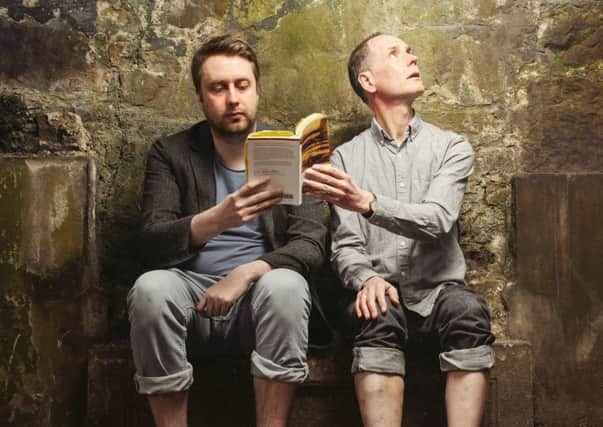Theatre interview: Rob Drummond on how losing his faith informed his new play


Bullet Catch is perhaps the most tensely theatrical show Drummond has produced so far in a career that began at the Arches a dozen years ago, after he graduated from Glasgow University; it was still on tour to festivals around the world five years after that first Arches performance. Yet it’s also entirely typical of the work of a playwright who approaches theatre with the sceptical eye of one who understands the relatively minor role it plays in the cultural life of the average western citizen-consumer; and although Drummond can, and does, produce well-made plays – last year, he wrote Grain In the Blood for the Traverse and Tron Theatres – his work often experiments with popular genres that audiences find more familiar, from quiz shows and television-style dating games to the strange, stylised world of British wrestling.
“When I was young, we didn’t go to the theatre to see plays,” says Drummond, who grew up in Paisley, Linwood and Rutherglen as the son of a Church of Scotland minister. “We went to see popular theatre – variety and pantomimes and things like that. So that’s the tradition I belong to, the one that draws me to theatre. I’m always thinking about how I can draw audiences in, give them an experience that’s going to be enjoyable or, if not always enjoyable, then memorable. And I find that if you use formats that people find familiar and easy to read – the magic trick, the television quiz, the wrestling match – then that gives you so much freedom to play with them, to challenge them, to explore the questions that arise.”
Advertisement
Hide AdSo it’s not surprising that the two new shows Drummond is writing or co-writing this autumn reflect these different strands of his creative life. The first, for the Play, Pie And Pint lunchtime theatre season in Glasgow and Edinburgh, is Pleading, a reworked version of a straightforward three-handed drama written for radio earlier this year, in which a young man and woman on a backpacking trip around the world find themselves arrested and held in a distant country for alleged drug smuggling. And in the second, Our Fathers – conceived by Nicholas Bone of the Edinburgh-based Magnetic North company – Drummond and Bone, both the sons of churchmen, use Edmund Gosse’s famous 1907 book on the same theme, Father And Son, to explore the experience of being the non-believing son of a man of faith.
“The story of Pleading is one I’ve wanted to write for a long time,” says Drummond, “simply because this is such a dramatic situation which can change people’s lives so suddenly – one minute on holiday or enjoying a gap year, the next literally pleading for their lives, in a criminal justice system they don’t understand.
Our Fathers, by contrast, takes Drummond to the heart of one of his formative experiences as an artist. Much of Drummond’s theatre work has been based on intense factual research, whether into artificial intelligence for his award-winning 2016 children’s show Uncanny Valley, or into the physiology and neurology of love, sex and romance for last
year’s Traverse dating show, In Fidelity; and he traces his fascination with science back to the moment, soon after he arrived at university, when he realised that he could no longer share his parents’ intense Christian faith.
“I suppose when you lose that world-view based on faith, then scientific method is the main alternative our culture has to offer,” says Drummond. “You get this very strong feeling of ‘won’t be fooled again’, and rigorous factual and scientific research seems like a defence against that.”
Drummond is acutely aware, though, that while the tension between competing belief systems has been an intensely personal matter for both him and Bone, it has also become one of the key global public issues of the 21st century; at the National Theatre in London, Drummond has just finished a controversial run of his show The Majority, in which audience members are invited to vote on appropriate responses to people whose views we find repellent, and on whether those should ever include violence, or “punching a Nazi”.
Advertisement
Hide Ad“I’m no longer a religious believer at all,” says Drummond, “but I still think secular humanism has a long way to go before it can offer what a church service can in terms of community building, and meeting the human need for that. And it is my experience that if you confront someone’s faith or belief system by simply telling them they’re wrong, it doesn’t change what they believe at all, and may even strengthen it. You have to try to open up a dialogue, and let people have the argument with themselves, rather than with you; otherwise there’s no real change.
“I hope Nicholas and I will be exploring all that in Our Fathers – how you can open up a conversation, or keep one going, across the gulf between two belief systems that seem irreconcilable. Because I believe this is a huge issue for our time; and that if you approach it believing that you are right, then you’re very probably wrong, and in danger of becoming pretty intolerant yourself.” ■
*Pleading is at Oran Mor, Glasgow, next week, and at the Traverse, Edinburgh, 3-7 October. Our Fathers is at the Traverse, Edinburgh, 21-28 October, and on tour across Scotland until 18 November.